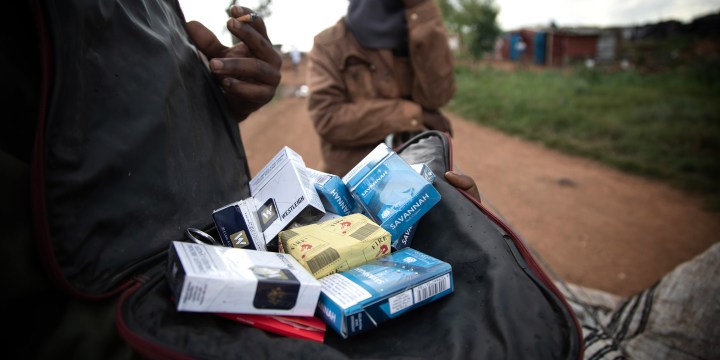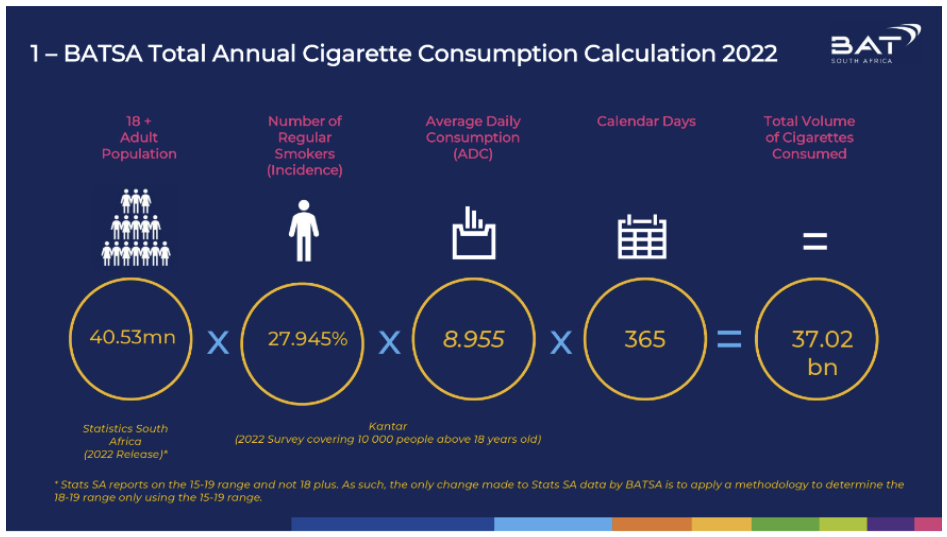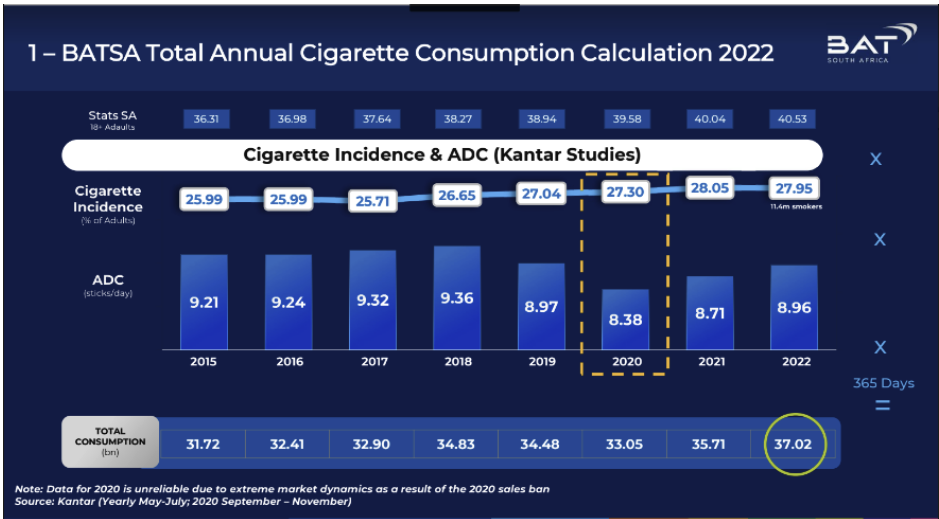CIGARETTE DISRUPTION
British American Tobacco fears profits will go up in smoke as illegal trade devours the market

The cigarette manufacturer says illicit tobacco is driving out legal operators and depriving South Africa of billions in excise duty.
Non-smokers (and ex-smokers) might not have been fazed by South Africa’s ban on cigarette smoking in the first pandemic year. They might not give a thought to the legal tobacco industry being wiped out by illicit traders, who were enabled during the Covid prohibition and have now snatched between 54% and 70% of the legal market.
And they might even agree with the proposed tobacco and vaping bill, which will punish smoking or vaping in the presence of a non-smoker or a child, or imprison those failing to comply with prescribed product standards.
The tobacco industry has a different take, arguing that the illegal trade deprives the South African Revenue Service (SARS) of billions in excise duty, which could be utilised to alleviate some of the country’s immediate problems; puts farmers out of business, and costs hundreds of jobs.
Instead of pushing through the Tobacco Products and Electronic Delivery Systems Control Bill, the industry says the government already has the tools and laws that will snuff out illegal operators, stimulate the supply chain and derive taxes that are due to the state.
All that’s required is enforcement.
Tobacco bill
The proposed tobacco legislation calls for all enclosed public areas and certain outdoor spaces to be 100% smoke-free, providing protection for non-smokers. Workplaces, restaurants and other public places will no longer be allowed to offer smoking areas. Smoking cigarettes and vapes in private dwellings used for commercial child care or education, or in cars carrying children under 18, will be outlawed.
Smoking in public spaces will be prohibited and, much to the chagrin of the cigarette companies, uniform plain packaging with graphic warnings, compulsory. Advertising of tobacco products, heated tobacco and electronic cigarettes at points of sale and the sale of cigarettes through vending machines will also cease to be permitted.
Potluck
For the first time, vaping products – touted as smoking cessation tools – will be regulated and flavours other than tobacco outlawed. It’s high time because the market is flooded with vape “juices” that are untested and potentially unsafe.
With lax enforcement and porous borders, many of these goods are imported via online retailers by consumers who have little idea of what they are buying.
Ingredients are undefined and therefore potentially unsafe: Vaping aerosols have been found to contain thousands of unknown chemicals and substances not disclosed by manufacturers, including industrial chemicals and caffeine, Johns Hopkins University researchers found.
Another study, published in the journal Chemical Research in Toxicology, suggests that those who vape are using products that could be risky.
In 2019, the US Centers for Disease Control and Prevention reported more than 1,000 people had been sickened by lung illnesses, most related to vaping products containing THC, the main psychoactive drug in cannabis, and other chemicals. Teenagers accounted for more than 150 of these cases. About 30 people died, reported Washington Post, the youngest being a 17-year-old boy from New York.
The CDC has warned about them and California has already banned flavoured tobacco and vape juices/pods.
While EU lawmakers are mulling a ban on flavoured tobacco and vape juices, regulators are seeking to keep pace with new developments to address the endless flow of new products entering the market.
In the Netherlands, the ban on e-cigarettes with flavours such as strawberry, mango, hazelnut paste or mojito became effective this year, because they are deemed to encourage children and young people from taking up vaping. Vaping liquids may now only taste like traditional tobacco.
Trust factor
Multinationals such as British American Tobacco South Africa (Batsa), who deem themselves to be good corporate citizens, say they are held to higher standards and feel “punished” for compliance. They have invested heavily in research into their Vuse vape products, ensuring the quality of ingredients, and employed more than 50 scientists to test everything from thermal stability and toxicology to device development and manufacturing, biosciences to analytic computing.
Batsa has been in the market for 100 years, but the illegal market in SA is killing their business. And they are bleeding revenue.
Visit Daily Maverick’s home page for more news, analysis and investigations
Already, profit margins are thin: On a pack of 20 cigarettes costing R32, R4.17 is attributable to VAT and R20.40 towards excise. Materials cost between R2 and R2.50. R3.20, or 10%, goes towards wholesale and retail margins and distribution, leaving the balance to Batsa, from which marketing, distribution, overheads and other costs are derived. It’s a break-even number, the company says.
Since 2015, Batsa has seen a sharp decline in volumes sold in SA, from 16.97 billion to 7.89 billion (2022). Contrast that with the other nine known cigarette manufacturers, who have seen a steady drop-off in declared volumes over the same period, from 4.45 billion to 2.11 billion.
Batsa, which produces Peter Stuyvesant, Dunhill, Pall Mall, Rothmans, Benson & Hedges and Kent, as well as the Vuse vape devices, calculates that there are at least 24.4 billion illicit cigarettes on the market, costing SA R24-billion in excise revenue only, excluding VAT and other taxes.
That’s based on Batsa calculations factoring in data from Statistics SA and a 2022 Kantar survey of 10,000 people over the age of 18.

In a population of 40.53 million adults in SA (Batsa, which contends it markets and supplies to adults, not children, so therefore does not factor in younger age groups into this calculation), 27.94% are smokers. These smokers light up on average 8.95 cigarettes per day (average daily consumption, or ADC), 365 days a year, bringing the total number of cigarettes to 37.02 billion a year.
Contrary to expectations, Batsa says smoking is also rising in SA: from 25.99% in 2015, to 27.95% in 2022.

Since 2020’s Covid shutdown, Batsa has been forced to decommission cigarette manufacturing machines and lay off staff. The latest round of retrenchments, announced in January 2023, affects about 190 of the group’s 1,100 local jobs. In 2018, Batsa employed 2,400 staff.
The decline of the company is evident, says Johnny Moloto, Batsa’s general manager. Their Heidelberg facility, designed to produce 50 billion cigarettes each year, produced 25 billion sticks four years ago. Now, it only produces a fraction of that.
“We are in a complete state of disarray, just like any other industry in the country. We are not unique, but we feel that it’s our obligation to [explain why].”
An estimated 37 billion sticks are put on to the Southern African Customs Union each year. Batsa produces – and, importantly, declares – 90% of cigarettes, which amounts to just 7.1 billion sticks a year, while the nine other SA manufacturers declare a total of 2.1 billion cigarettes a year.
Philip Morris and other international suppliers import 3.4 billion sticks legally each year, paying taxes on the products.
If the maths looks baffling, that’s because it is: The numbers don’t add up – these nine local manufacturers would have to run at least one cigarette machine each to produce the declared 2.1 billion cigarettes. Operating at an average speed, each machine would comfortably be able to produce 6,000 sticks per minute. To reach 2.1 billion sticks, those machines each would only need to run for 13 weeks, with one shift per day per manufacturer. What then happens with those machines for the rest of the 39 weeks of the year?
Where are the other 27.8 billion cigarettes coming from?
Made in SA
Likely smuggled over the border with Zimbabwe and Mozambique, but Moloto says the biggest problem lies right here in South Africa: “It’s a homegrown problem. The vast majority of illegal cigarettes, over 24.4 billion, are produced right here.”
Zimbabwe, which has a small market relative to SA, consumes about 1.5 billion sticks, but it has the capacity to produce about seven billion sticks. It is believed a significant percentage of illegal cigarette sales in SA, about 4.4 billion or 12%, are smuggled across the Zimbabwean border.
With porous borders, a significant excise tax differential and organised cartels operating in the region, this is a booming trade.
During last week’s Budget speech, Finance Minister Enoch Godongwana said over the past three years, SARS has taken several steps to enhance its effectiveness in combating illicit trade, particularly in tobacco.
“To this end, SARS has completed 2,316 seizures of cigarettes and tobacco products to the value of R598.8-million. An additional R18-billion worth of schedules and assessments have been raised, targeting syndicated tobacco-related crimes.
“Furthermore, SARS has collected more than R1.2-billion in revenue and handed over 92 cases for criminal proceedings with the NPA, of which two resulted in successful convictions relating to tobacco smuggling syndicates.”
On Saturday, the Hawks announced they had seized R30-million worth of suspected illicit cigarettes from a farm between Musina and Beitbridge in Limpopo.
Five suspects, aged between 26 and 44, were arrested for contravening the Customs and Excise Act.
Monitored production
Batsa’s facility in Heidelberg is a customs area, which is rented from SARS. The revenue service has set up CCTV cameras to monitor production. Every stick is counted, tracked and traced.
“On a daily basis, we submit reports to demonstrate how much we are producing. When SARS wants to audit us, it can see that every declaration is honest and true.”
Was SARS able to do this with all the other local manufacturers, he asked? [SARS has not yet responded to this question – this story will be updated once it does.]
Batsa says existing policies, including production counts and CCTVs, must be instituted at all cigarette manufacturing plants.
Border controls need to be strengthened, a minimum retail price of R32 per pack of 20 should be introduced, and international treaties ratified, such as the WHO’s Framework Convention on Tobacco Control Illicit Trade Protocol (ITP), aimed at eliminating illicit trade in tobacco products. Fundamental to that is the introduction of an ITP-compliant track-and-trace system.
The trade in illegal cigarettes has a far wider impact than just bleeding market share through normal competition. It harms the economy by depriving SARS of more than R20 in excise duties per pack. BM/DM



















 Become an Insider
Become an Insider
Its a filthy habit and a filthy business. Cigarettes are only consumed by the extremely stupid (can you name any other product that has warnings such as “Smoking Kills” etc etc?.) Illegal on many levels, even the likes of BATSA. I celebrate BATSA’s “challenges” and long for the day of this industry’s total demise
As with the SOE’s this corruption needs to be exposed ( thank you DM) and stamped out! Not only are illicit cigarettes harming SARS earning potential but is encouraging more smoking as people access cheaper alternatives. Makes a joke of the new “ Sin Tax” too! When SARS can’t fine extra revenue from this tax they will come after normal tax payers for the shortfall.
The crook with a doek is largely responsible for this mess with her ridiculous ban on cigarettes during the first lockdown. Many smokers obtained illicit cigarettes at that time, and have never returned to the legal market because illicit cigarettes are much cheaper.
Remember British Tobacco, “Everybody has to eat a little” how do you fight that level of corruption ! They need to expose those officials, and put them in Orange overalls.
Yes there is a loss in revenue but there is also the cost of smoking : Cancer, bronchial ailments, days of work and so on.
As an ex-smoker I have no sympathy for the tobacco industry legal or illegal. In my opinion the industry should not exist in any form legal or illegal as it only harms people.
The doek lady knew exactly what she was doing! Making her son rich Nowhere else in the world was there a ban on cigarettes during the pandemic.